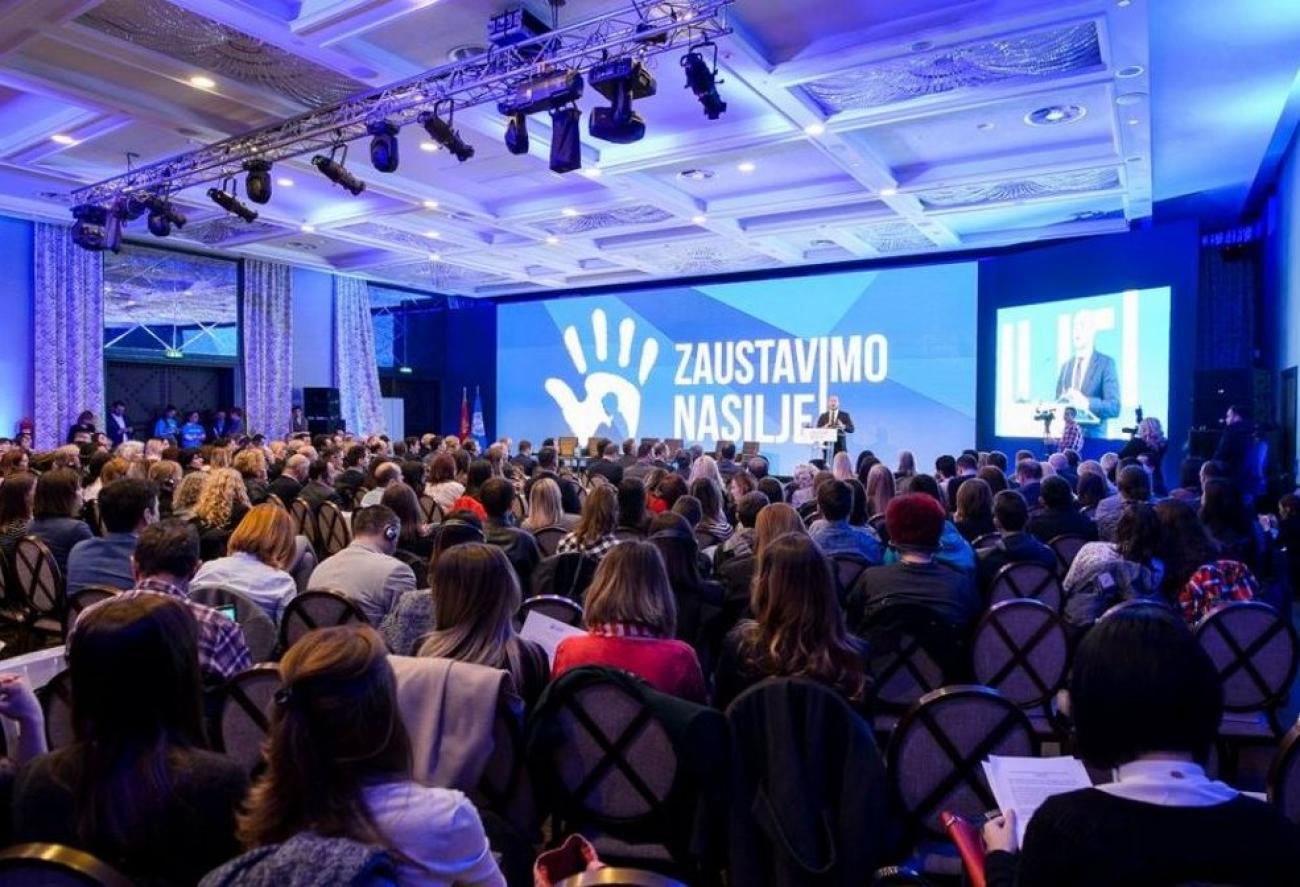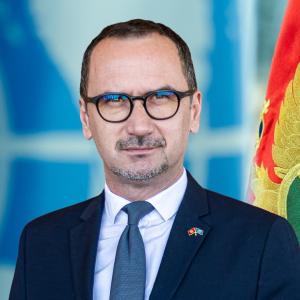“End Violence” conference sparks a public debate on parenting in Montenegro

The data show that adverse childhood experiences are much more present than discussed in public and there is still a high tolerance of violence in the society.
Violence, neglect and dysfunctional parenting have long term costs for children, their families and societies, but can be prevented through stronger public health and child protection interventions – this was the key message of the conference "End Violence Against Children", which brought together the President of Montenegro, six Ministers, of : Labour and Social Welfare, Health, Education, Justice, Internal Affairs and Human Rights and international and local experts on violence against children.
The conference was organized by the Government of Montenegro and UNICEF in partnership with the EU and the Telenor Foundation. The need for a decisive action regarding violence against children is evident from the results of UNICEF research from December 2016.
The data show that adverse childhood experiences are much more present than discussed in public and that there is still a high degree of tolerance of violence in the society. Every second citizen finds physical punishment acceptable and thinks that yelling at a child is not a form of violence. Every third citizen does not consider a slap in the face and open threats to the child to be violence, while one quarter do not see blackmailing as a form of violence in the upbringing of children. Most citizens, 77 percent of them, believe that parents should not allow children to question their decisions.
The consequences of growing up in a violent environment now have a strong evidence base as set out in a captivating presentation to 400 delegates including the president and deputy prime Minister, by Dr Nadine Burke Harris, a world class thought-leader, campaigner and practitioner.
"High doses of negative experiences in childhood affect our brain and other organs, immune system, even the DNA. Children exposed to adverse childhood experiences are more likely to develop heart disease and to commit suicide," said Burke Harris at the conference, which marked the beginning of the second phase of the “End Violence” campaign initiated by the Government of Montenegro and UNICEF which shifts focus from online violence last year, to family violence this year.
UNICEF Montenegro Representative Benjamin Perks, pointed out that adversity, violence and neglect are far more prevalent than we ever knew before with up to 40% of children growing up with poor parental attachment.
"Adversity is often passed from a parent to a child in an endless inter-generational cycle of pain, humiliation and despair and with grave consequences for our society,"
Benjamin Perks, UNICEF Montenegro Representative
Pwerks urged the conference participants to make efforts to break the public taboo which obscures the problem of violence against children.
This appeal was joined by the Charge d'Affaires and Head of Cooperation at the EU Delegation to Montenegro, Andre Lys. "We must not allow a single child to live in fear, especially within their families. 90 percent of violence is never discovered, so it is especially important not to be silent, but to speak out," Lys pointed out. A draft Strategy for the Prevention and Protection of Children from Violence 2017-2021 was presented.
Six ministers who attended the conference pledged to reduce the number of children facing adverse childhood experiences in Montenegro.
Minister of Labour and Social Welfare, Kemal Purišić, said that, in the next four years, the Government would direct the state resources towards the strengthening of the child protection system, in line with the Convention on the Rights of the Child and other international documents regulating this field. He explained that this process will also include active engagement of the Ministry of Justice, Ministry of Internal Affairs, Ministry of Health, Ministry of Education and Ministry of Human and Minority Rights, as they would work in partnership to create proper regulation for fighting violence against children.
"In cooperation with the Ministry of Internal Affairs and other partners, the Ministry of Labour and Social Welfare will establish a national safe-house for children victims of violence, which will further develop special programs for children victims," Purišić said adding that in this safe-house medical check-ups and forensic interviews with children who have been exposed to abuse or violence would take place in future.
"The Government would direct the state resources towards the strengthening of the child protection system, in line with the Convention on the Rights of the Child"
Kemal Purišić, Minister of Labour and Social Welfare of Montenegro
Deputy Prime Minister and Minister of Justice, Zoran Pažin, said that it was necessary to establish a register of persons convicted for sexual abuse of children.
"I believe that the deadline for this which is provided in the draft Strategy as year 2021, is inappropriately long, as I think this should be done in a shorter period,"
Zoran Pažin, Deputy Prime Minister and Minister of Justice
The Government of Montenegro committed to join the UN Global Partnership to End Violence Against Children and this was saluted by the Director of the partnership: Susan Bissell, who added: "This partnership depends on the commitment of the countries. It is a platform for all countries wishing to implement the global sustainable development goals and to accelerate action at the national level to put an end to violence against children," Bissell pointed out.
The conference appealed for the establishment of quality, multidisciplinary services for the promotion of positive parenting and protection of children from adverse childhood experiences.
Professor Frances Gardner, from the University of Oxford explained how services such as pre-natal visits, screening, patronage services, as well as the expansion of preschool education can prevent or mitigate the effects of violence and adverse childhood experiences. Professor Gardner presented a parenting support program which includes a set of successful parenting practices that can be applied in different cultures.
"The program was established in various countries on the basis of the degree to which these countries nurture traditional values in family relations. Its effects are equally strong in traditional societies - we have programs in Iran, Hong Kong, in some deeply religious societies, as well as in the liberal countries," said Gardner, who is a Professor of Child and Family Psychology at Oxford University.
Global positive trends in successful parenting practices are also promoted by the UNICEF Office of Research - Innocenti. Its representative at the conference, Jasmina Byrne, who manages research related to child protection issues, family and parental support, and digital technologies, explained that the most popular services are specialized support centers for parents. She particularly emphasized the importance of services intended for families going through crisis.
"There are targeted family visits intended for families who are experiencing certain problems. When it comes to these programs, the emphasis is on supporting families to resolve their problems on their own," said Byrne, who reminded that Montenegro has recently launched a national SOS line which provides support to parents to implement positive parenting practices.
David McLaughlin, Deputy Director of UNICEF Regional Office for Central and Eastern Europe and the Commonwealth of Independent States, presented the conference conclusions reminding that this is just a beginning of a public debate on violence against children in Montenegro, which will raise awareness about the benefits of non-violent upbringing of children and promote best parenting practices.
Written by






